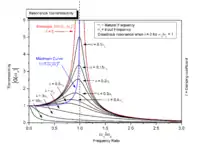| Subject classification: this is a physics resource. |

Resonance effect for various input frequencies and damping coefficients.
In physics, resonance is the tendency of a system to vibrate with increasing amplitudes at some frequencies of excitation. These are known as the system's resonant frequencies (or resonance frequencies) [1].
An example of useful effect of resonant frequency is a guitar string which makes a characteristic noise when it is touched. The noise depends on how thick or slack the string is.
In earthquake engineering, on contrary, any possibility of a resonance is detrimental for the building structure.
Other pages
References
This article is issued from Wikiversity. The text is licensed under Creative Commons - Attribution - Sharealike. Additional terms may apply for the media files.